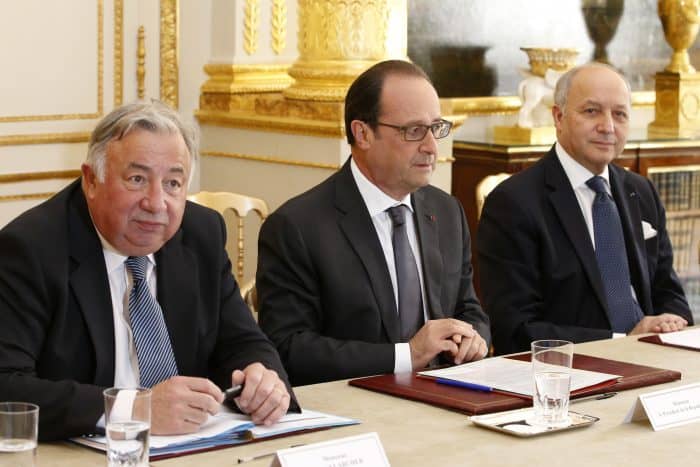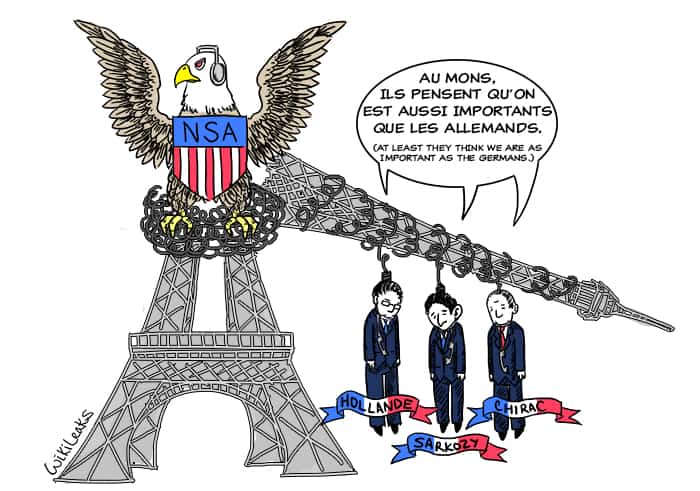PARIS – France expressed outrage on Wednesday at “unacceptable” U.S. spying on President Francois Hollande and his two predecessors that was detailed in leaked documents.
Hollande spoke by phone with U.S. President Barack Obama, who gave fresh assurances that spying on European leaders had ended, while France’s foreign minister summoned the U.S. ambassador for a formal explanation.
“President Obama reiterated without ambiguity his firm commitment … to stop these practices that took place in the past and which were unacceptable between allies,” Hollande’s office said in a statement after the call.
The documents — labelled “Top Secret” and appearing to reveal spying on Jacques Chirac, Nicolas Sarkozy and Hollande between 2006 and 2012 — were published by WikiLeaks along with French newspaper Liberation and the Mediapart website.
Hollande earlier convened his top ministers and intelligence officials to discuss the revelations, with his office stating that France “will not tolerate any acts that threaten its security”.
The leak was embarrassingly timed for French lawmakers, who were expected to approve sweeping new powers to spy on citizens later on Wednesday.
The new law will allow authorities to spy on the digital and mobile communications of anyone linked to a “terrorist” inquiry without prior authorization from a judge, and forces Internet service providers and phone companies to give up data upon request.
Addressing parliament, Prime Minister Manuel Valls said Washington’s actions “constitute a very serious violation of the spirit of trust” and France would demand a new “code of conduct” on intelligence matters.
The White House earlier responded that it was not targeting Hollande’s communications and will not do so in the future, but it did not comment on past activities.
Claims that the U.S. National Security Agency (NSA) was spying on European leaders, revealed by whistleblower Edward Snowden in 2013, had already led to promises from Obama that the practice had stopped.
“Commitments were made by the U.S. authorities,” the Elysee Palace said in a statement. “They must be remembered and strictly respected.”

Secret meetings on Greece
The leaked documents include five from the NSA, the most recent dated May 22, 2012, just days after Hollande took office.
It claims Hollande “approved holding secret meetings in Paris to discuss the eurozone crisis, particularly the consequences of a Greek exit from the eurozone.”
It also says the French president believed after talks with German Chancellor Angela Merkel that she “had given up [on Greece] and was unwilling to budge.”
“This made Hollande very worried for Greece and the Greek people, who might react by voting for an extremist party,” according to the document.
Another document, dated 2008, was titled “Sarkozy sees himself as only one who can resolve the world financial crisis.” It said the former French leader “blamed many of the current economic problems on mistakes made by the U.S. government, but believes that Washington is now heeding some of his advice.”
One leak describes Sarkozy’s frustration at U.S. espionage, saying the “main sticking point” in achieving greater intelligence cooperation “is the U.S. desire to continue spying on France.”
In Washington, National Security Council spokesman Ned Price insisted: “We do not conduct any foreign intelligence surveillance activities unless there is a specific and validated national security purpose. This applies to ordinary citizens and world leaders alike.”
France’s ambassador to the U.S., Gerard Araud, appeared to downplay the revelations, saying on Twitter: “Every diplomat lives with the certainty that their communications are listened to, and not by just one country. Real world.”
https://twitter.com/GerardAraud/status/613471873519779840
Important, confidential discussions are held by “secure methods of communication”, he continued, but “all our other devices are, by definition, listened to.”
WikiLeaks founder Julian Assange said French citizens had a right to know their government was “subject to hostile surveillance from a supposed ally,” and promised more “timely and important” revelations soon.
At the time of the Snowden leaks, British newspaper The Guardian reported that the NSA had listened in on the phone calls of 35 world leaders, including the leaders of France, Mexico and Brazil.
While it was not known then if Hollande’s phone was bugged, the French leader had said on a visit in Washington in February 2014 that the two allies had resolved their differences over U.S. digital eavesdropping.
“Mutual trust has been restored,” Hollande said at the time.






